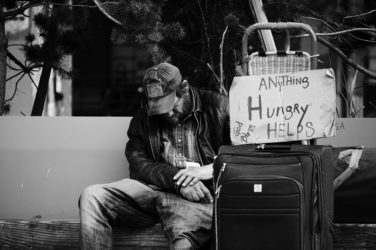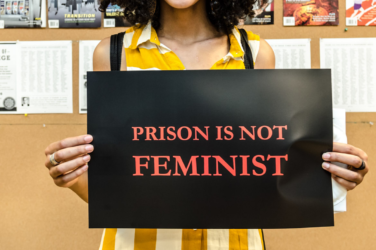The first time I had sex after ending my abusive relationship in 2008, I loved it because it felt like a rebellion. My abuser had been so jealous that even having male friends was dangerous. Sex with another man was like a revolutionary act. The first time I had sex with two different men in the same day, I felt like a guerrilla radical. But the subversion was all I liked about it. I was so dissociated from my body, I barely even inhabited the act.
Sex wasn’t sex anymore, and that terrified me. It wasn’t just about not having an orgasm; I felt detached from humanity. Like by age 21, I’d already lost one of the essential components of adulthood. I began to think about suicide constantly. I felt destined to a permanent, disembodied loneliness.
Then, in 2010, I tried heroin.
Many people who don’t use drugs believe that in order to avoid addiction, you simply need to avoid taking drugs with addictive potential. For many years, I did just that. I remember declining an offer to try heroin with a close friend who had become addicted. I tried other drugs—lots of them—but always said no to heroin because, somehow, I already knew I’d like it too much.
It’s completely devastating to be afraid to have sex because your body is a crime scene you don’t want to revisit.
But that was before I spent four years being raped and bitten and strangled. Before I lost the ability to feel joy, or to enjoy sex. When a guy I was seeing offered me heroin, melted in a runny black zig-zag across a scrap of aluminum foil, I decided I didn’t have anything left to lose.
I expected to nod out, to become numb, to escape from reality for a couple hours. I didn’t expect to feel, for the first time in years, the genuine, pressing desire to fuck.
If you’ve never lost your libido, that might sound silly, or petty. But sexual intimacy is a crucial component of life. Not having sex for a while feels frustrating, sure. But it’s completely devastating to be afraid to have sex because your body is a crime scene you don’t want to revisit. Imagine feeling that way for years—and then suddenly discovering that a few tokes of an easily attainable drug will allow you to want sex again.
The relationship between trauma and addiction is well established. “We know that people who have been assaulted are thereby likely to develop PTSD, depression, anxiety, and that those disorders have high associations with developing a [Substance Use Disorder] SUD later,” says Dr. Sheila Vakharia, policy manager for the Office of Academic Engagement at the Drug Policy Alliance. “We also know that opioids are particularly good to help calm, soothe and provide euphoria—all emotional experiences that someone who has been hurt may be drawn to having.” Studies around the globe confirm that trauma and PTSD are intimately connected to problematic use of drugs, and particularly opioids.
As I reported for Filter last year, many addiction treatment programs still use degrading tactics that reinforce trauma. But a shift is underway. Buprenorphine prescriber Dr. Justine Waldman, for example, uses a harm reduction approach to addiction care at REACH, an equitable health hub in Ithaca, New York.
“At our practice we offer stigma-free care,” explains Waldman, “We work with patients, witnessing where they are at. [For example,] we offer Suboxone and say we’re not necessarily expecting you, [the patient], to be abstinent. We are hoping we can improve your quality of life.”
While expanding patient-centered, non-judgmental care will certainly help traumatized populations heal more holistically from addiction, I fear it’s still not enough. Sexual assault is a very specific type of trauma with unique and debilitating consequences. An oft-repeated treatment mantra urges providers not to “take away something you can’t replace.” This is supposed to help patients and providers identify what drugs do for them—the role they play in the patient’s life—and how to achieve those benefits in healthier ways.
But what do we do when drugs give us something as basic as the capacity to feel pleasure?
A “Special Power” for Rape Survivors
Megan*, 33, a mother and methadone patient living in New Jersey, was gang-raped in an alleyway when she was 16. She began using heroin shortly thereafter, and describes the drug as having a special power in the bodies of sexual assault survivors.
“After [the rape], Megan left,” she says. “I was just an empty shell. Heroin allowed me to come out of that shell, essentially. I could not engage in any kind of sexual activity without it … I needed it to even be able to get in the mood, because it allowed me to release my inhibitions.”
Keri, 35, a student and mother in Illinois, was raped by her friend’s older brother when she was just 12. She says she didn’t try opioids for several years, but eventually decided the benefits outweighed the risks. “I made a conscious decision to numb my pain with substances. DARE had told me it was an unhealthy coping skill, but I just needed some relief from the constant feelings of self-hate and anxiety.”
They found that the drug gave them a sense of detachment that, ironically, allowed them to inhabit their bodies.
Like these women, I also never thought of heroin as a good idea. But I already considered myself a lost cause—someone who had been used and tossed aside. Someone who didn’t have a full life to look forward to. Heroin offered the possibility of relief. What I didn’t expect was for it to give me back what I had been missing.
When I took heroin, I was able to love sex again. I was able to love again. I never expected that, but once I found it, I didn’t ever want to give it up.
Keri and Megan both also found more than just relief in heroin. They found that the drug gave them a sense of detachment that, ironically, allowed them to inhabit their bodies, and to enjoy what they could do while in those bodies—including sex.
“Opioids made me feel so euphoric, and usually it made me feel like I loved everyone,” Keri recalls. “I was a lot more physical in my affection toward other people, whereas sober I tended to avoid being touched or touching anyone else.” While sober, she says, sex felt too “real” to be enjoyed.
When Quitting Heroin Kills Sex
Ultimately, all three of us decided it wasn’t a good trade. Megan and Keri both now use prescribed methadone instead. For me, too, enrolling in methadone treatment in 2013 was my first step toward a life without heroin. For the most part, it’s been a good choice—but I still feel my loss.
Five years have passed, and I still haven’t found a way to take pleasure in sex sober the way I can while intoxicated.
Megan says that it was several months after quitting heroin before she could even engage in sex, much less enjoy it—and that she still feels uncomfortable eight years after her last use. “When I first met my fiancé, I was just getting onto the methadone clinic,” she recalls. “When we had sex I would drink, even though I despise and loathe alcohol, because like heroin, it released the inhibitions. So that was the first two months of us dating: me drinking to get drunk for the sole purpose of being able to have sex and stand my body.”
Thus far, I have not found a cure for my sexual trauma. My recovery work has included pharmacotherapy, trauma-informed women’s group therapy, mindfulness-based individual therapy, yoga and writing. But none of these have specifically focused on healing from sexual assault.
After a suicide attempt in 2016 (which is not uncommon for sexual assault survivors, nor for people with addiction), I was referred, for the first time, to a clinic that specialized in treating people with co-occurring disorders related to sexual trauma.
I was shaking as I walked to the clinic. After years of hiding behind heroin until it almost killed me, my sexual trauma was finally going to receive the attention it deserved. It seemed almost too good to be true.
Turns out, it was. When I showed up, I was turned away because my Medicaid wouldn’t cover the specialized program.
My husband didn’t sign up for a sexless life. Frankly, neither did I.
Keri, who has not used opioids other than methadone in about 14 months, says that she no longer has any sexual desire. Lately, she isn’t even interested in masturbation. “I barely see myself as a sexual being,” she says. As for her marriage? Her husband, she says, has always had a relatively low sex drive, and now that he takes buprenorphine—which can lower libido in some patients—he is not as bothered by her lack of sexual desire as he once was.
My situation is similar to Keri’s. My husband’s long-term methadone prescription has dampened his libido enough to help us maintain a tentative marital stasis.
But methadone hasn’t fully quashed his sex drive the way sexual assault and sobriety have mine. So those nights still arrive when I have to choose between my comfort and my husband’s desire, which is not as easy a choice as some might believe it to be.
My husband didn’t sign up for a sexless life. Frankly, neither did I. So far, however, I have not been able to access a program equipped to help. And that makes every day, for me, into a decision between enjoyable sex and sobriety.
*Name has been changed.
Photo by DAVIDCOHEN on Unsplash





Show Comments